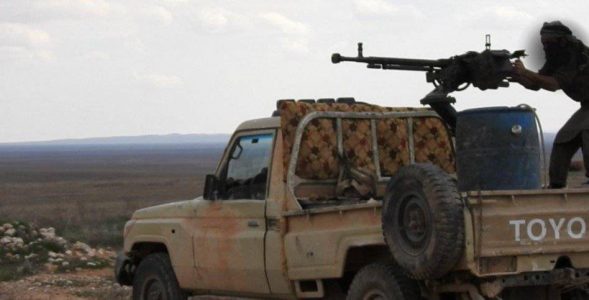
Islamic State terrorist group exploits the coronavirus pandemic
In April 2020, the Islamic State launched new offensives in Iraq and Syria as the coronavirus pandemic distracted the U.S.-led coalition and local security forces. The attacks were the deadliest and most sophisticated attacks—including suicide bombings, nighttime ambushes of security forces and assassinations—since the fall of the territorial caliphate in March 2019.
“[Muslims] must have no pity for the disbelievers and the apostates even as they are at the height of their tribulation,” ISIS said on March 19 in al Naba, its weekly newsletter. “They must intensify the pressure on [disbelievers and apostates] so they become more pressured and incapable of harming the Muslims by the permission of God.”
The offensive coincided with a reduction of U.S. counterterrorism operations due to COVID-19. On March 19, the U.S.-led coalition and NATO paused their training missions to avoid large gatherings of military personnel in Iraq. The U.S. then scaled back operations against ISIS in both Iraq and Syria. Coalition troops suspended joint raids with Iraqi forces and the Kurdish-led Syrian Democratic Forces (SDF).
ISIS took advantage of the reduced pressure from the coalition. In April, ISIS launched 151 attacks in both countries – a 50 percent increase over the previous month. In May, it claimed 193 attacks. “If the pattern continues in the coming months, ISIS is likely to become a far greater threat that will be much harder to contain than it is now,” Hassan Hassan wrote in The Guardian on May 24.
During the pandemic, the ISIS propaganda campaign tried to energize fighters and followers to instigate bolder attacks. “We advise you to be harsh upon the disbeliever enemies of God,” Abu Hamza al Qurashi, the ISIS spokesman, said on May 28. “Address them with the sharp swords and ignite the expeditions and do not stop the raids.
And do not let a day pass for the apostates and their Crusader masters without disturbing their life. Ambush them on the roads, burn their convoys with IEDs, destroy the checkpoints and barracks.”
As the infection spread to Europe and the United States, ISIS called the virus a ”painful torment” for all non-Muslims, particularly “Crusader nations” in the West. “The last thing they want is to send more of their soldiers to areas where the disease is likely to spread or to be compelled to mobilize security personnel and soldiers inside the land,” ISIS said on March 19.
In the March 12 issue of al Naba (“Tidings”), ISIS said that God had willed the disease against infidels. “Diseases do not infect but by the command and will of Allah.” The Islamic State warned that infidels would face the kind of violence and destruction that they had inflicted on ISIS during the caliphate.
Al Qurashi said, “So just as the corpses of the monotheists were thrown in the roads by the bombing of your aircraft, and the Muslims clung to their homes in fear of your missiles, here today by the grace of God Almighty you see how the corpses of your brothers have been thrown in the roads and garbage piles, and a quarantine has been imposed on you so you do not go out from your homes.”
ISIS urged followers to avoid Europe during the epidemic to prevent infection. It quoted a hadith from Mohammed al Bukhari, one of the six major recorders of the Prophet Mohammed’s words and deeds. Muslims who quarantined during a pandemic would achieve the same status of martyrdom in the afterlife.
“I asked the messenger of Allah about the plague and he told me ‘It is a torment that Allah descends on whom he wishes, and Allah made it a source of mercy for the muminin (the faithful), for if one in the time of an epidemic stays in his country patiently hoping for reward from Allah and believing that nothing will befall him except what Allah has decreed, he will get the reward of a martyr.” ISIS instead called for more operations to free ISIS prisoners in Iraq and Syria and pressure “apostate” governments.
Source: Wilson Center





